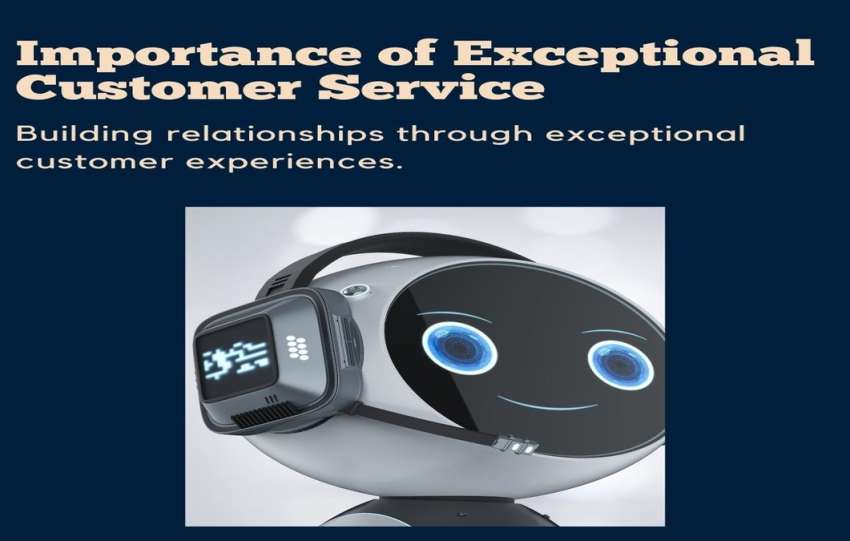Importance of High Quality Customer Service
High-quality customer service keeps customers happy, improves your business’s reputation, increases sales, and creates a positive environment for both customers and employees.

- Builds Customer Loyalty: When you treat customers well, they are more likely to come back. Loyal customers are essential for steady business growth.
- Boosts Reputation: Good service leads to happy customers who spread the word. This improves your business’s reputation and attracts new customers.
- Increases Sales: Satisfied customers tend to buy more and recommend your business to others, boosting sales and profits.
- Solves Problems Quickly: Effective customer service resolves issues fast, preventing small problems from becoming big headaches.
- Stands Out from Competitors: Excellent service can set your business apart in a crowded market, making customers choose you over others.
- Keeps Employees Happy: Dealing with happy customers makes the workplace better for employees, improving their job satisfaction and performance.
Key Points for Great Customer Service
- Listen Carefully: Understand what customers need and respond to their concerns.
- Be Quick: Address questions and problems as soon as possible.
- Show You Care: Make customers feel important and valued.
- Know Your Stuff: Be knowledgeable about your products or services.
- Follow Up: Ensure that issues are fully resolved and customers are satisfied.
Applications of Artificial intelligence in Customer Support
- Chatbots and Virtual Assistants: AI-powered chatbots and virtual assistants handle routine inquiries, provide information, and guide customers through processes, offering immediate and efficient support.
- Automated Ticketing Systems: AI automatically categorizes and prioritizes support tickets, ensuring urgent issues are addressed promptly while managing routine inquiries efficiently.
- Sentiment Analysis: AI analyzes customer interactions to gauge sentiment and emotion, helping businesses understand customer feelings and improve their service accordingly.
- Predictive Support: AI predicts potential issues by analyzing customer data and usage patterns, allowing businesses to address problems before they escalate, enhancing proactive support.
- Personalized Recommendations: AI tailors product and service recommendations based on individual customer preferences and behaviors, improving the overall customer experience and increasing satisfaction.
- Voice Recognition and Natural Language Processing (NLP): AI-powered voice recognition and NLP enable more intuitive and natural interactions, allowing customers to speak naturally and be understood accurately by the system.
- Multilingual Support: AI supports multiple languages, breaking down language barriers and making customer service accessible to a global audience.
- Fraud Detection: AI monitors transactions and interactions for suspicious activity, helping to detect and prevent fraud, thereby protecting customers and the business.
- Knowledge Base Management: AI helps manage and update knowledge bases by automatically organizing information and suggesting relevant articles or FAQs to customers and support agents.
- Feedback Analysis: AI collects and analyzes customer feedback from various channels, such as surveys and social media, providing actionable insights to improve products and services.
- Automated Follow-Ups: AI can schedule and send automated follow-up messages to customers after support interactions, ensuring issues are resolved and enhancing customer satisfaction.
- Interactive Voice Response (IVR) Systems: AI enhances IVR systems by providing more accurate and efficient call routing based on voice inputs and customer data, improving the call handling process.
These applications of AI in customer support streamline operations, enhance customer experiences, and provide valuable insights to businesses, ultimately leading to improved efficiency and customer satisfaction.
Benefits of AI in Customer Support
- 24/7 Availability: AI chatbots can help customers anytime, day or night, ensuring they always get support when needed.
- Instant Responses: AI handles many questions at once, providing quick answers and reducing wait times for customers.
- Personalized Interactions: AI analyzes customer data to give tailored recommendations and solutions, making each experience unique and relevant.
- Cost Efficiency: Using AI reduces the need for a large customer support team, cutting down on costs while maintaining quality service.
- Scalability: AI can easily handle more customer inquiries during busy times without slowing down, making it perfect for growing businesses.
- Consistent Quality: AI provides consistent answers and follows guidelines, ensuring customers always get accurate information.
- Proactive Support: AI predicts potential issues by spotting patterns in customer behavior, allowing businesses to fix problems before they escalate.
- Data-Driven Insights: AI gathers and analyzes customer data to provide insights that help improve products and services.
- Multilingual Support: AI can support multiple languages, making it easier to assist customers from different parts of the world.
- Improved Agent Productivity: By handling routine tasks, AI allows human agents to focus on more complex issues, increasing their productivity and job satisfaction.
Enhanced Customer Interaction with Chatbots

Chatbots improve customer interaction by offering instant, personalized support, enhancing overall user experience and satisfaction. Their efficiency and accessibility streamline communication, benefiting both businesses and customers.
24/7 Availability
One of the most significant advantages of AI on customer support is the ability to provide 24/7 service. Chatbots, powered by AI, can handle customer inquiries at any time of the day, ensuring that customers receive timely responses regardless of time zones.
Example: H&M’s Chatbot
H&M’s chatbot, available on their website and mobile app, assists customers with product inquiries, order tracking, and even fashion advice. This 24/7 availability ensures customers can get help whenever they need it, improving overall satisfaction.
Instant Response
AI chatbots can handle multiple inquiries simultaneously, providing instant responses to common questions. This reduces waiting times and enhances the customer experience.
Example: Sephora’s Virtual Assistant
Sephora’s virtual assistant answers beauty questions, suggests products, and schedules in-store appointments, helping customers decide on purchases faster.
Personalized Customer Experience

Personalized customer experience tailors products and services to individual needs, enhancing satisfaction and loyalty. This approach builds stronger relationships, leading to more meaningful interactions and increased customer retention.
Tailored Recommendations
AI can analyze customer data to provide personalized recommendations. By understanding customer preferences and behaviors, AI systems can suggest products or services that are most relevant to the individual.
Example: Amazon’s Product Recommendations
Amazon uses AI to suggest products based on what customers have looked at or bought before, making shopping more convenient and boosting sales.
Predictive Customer Support
AI has the ability to expect problems before they occur, enabling businesses to take preventive steps to meet customer needs. This preventive approach not only minimizes frustration but also fosters stronger customer loyalty.
Example: Netflix’s Predictive Support
Netflix uses AI to predict when a user might experience streaming issues based on their internet connection and device usage patterns. The system then offers troubleshooting tips or adjusts streaming quality to prevent interruptions.
Streamlined Operations

Using efficient processes and technology to quickly address customer needs and provide better service. This approach will revolutionize customer support by making it faster and more effective, leading to higher satisfaction.
Automated Ticketing Systems
AI can simplify how customer inquiries are managed by sorting and prioritizing support tickets automatically. This means urgent issues get attention right away, and routine questions are handled with ease, making the whole process smoother and more efficient.
Example: Zendesk’s AI-Powered Ticketing
Zendesk uses AI to automate ticket classification and routing. This allows support agents to focus on resolving complex issues while the AI handles routine tasks, improving overall efficiency.
Voice Recognition and Natural Language Processing
AI-driven voice recognition and natural language processing (NLP) technologies enhance customer interactions by understanding and responding to spoken language. This makes customer support more intuitive and accessible, improving overall user experience.
Example: Google Duplex
Google Duplex uses advanced voice recognition and NLP to make phone calls on behalf of users, such as booking reservations or setting appointments. This technology demonstrates how AI can handle complex interactions in a natural and human-like manner.
Improved Customer Insights

It gives a deeper understanding of the customers’ preferences, behaviors, and needs. This understanding allows businesses to tailor their support and services more effectively, leading to better customer experiences and relationships.
Data Analysis and Sentiment Analysis
AI can analyze vast amounts of customer data to uncover insights about customer preferences, behaviors, and sentiment. This information can be used to improve products, services, and overall customer experience.
Example: Salesforce’s Einstein AI
Salesforce’s Einstein AI examines how customers interact with a business to understand their feelings and actions, providing valuable insights. This enables companies to adjust their marketing and support approaches, enhancing their ability to meet customer requirements more effectively.
Enhanced Feedback Collection
AI can automate the process of collecting and analyzing customer feedback. By understanding customer opinions, businesses can make informed decisions to improve their offerings.
Example: Medallia’s AI-Powered Feedback
Medallia uses AI to analyze customer feedback from various channels, such as surveys, social media, and reviews. This helps businesses understand customer sentiment and identify areas for improvement.
Use Cases of Chatbots in Customer Interaction
-
E-commerce:
- Product Recommendations: Chatbots can suggest products based on browsing history and preferences.
- Order Tracking: Customers can check the status of their orders and delivery schedules through chatbots.
-
Banking and Finance:
- Account Services: Chatbots can assist with balance inquiries, transaction history, and account management.
- Loan Applications: They can guide customers through loan applications and provide information on different financial products.
-
Healthcare:
- Appointment Scheduling: Chatbots can help patients book appointments with healthcare providers.
- Symptom checking: They can provide preliminary assessments based on reported symptoms and suggest next steps.
-
Travel and Hospitality:
- Booking Services: Chatbots can facilitate hotel reservations, flight bookings, and itinerary planning.
- Customer Support: They can handle queries related to booking modifications, cancellations, and travel advisories.
Challenges and Considerations

The challenges and considerations of revolutionizing customer support with AI include ensuring data privacy, maintaining AI accuracy, and addressing ethical concerns. Businesses must also consider the cost of implementing AI and the need for human oversight to ensure customer satisfaction.
Maintaining Human Touch
While AI can handle many aspects of customer support, maintaining a human touch is essential. Customers still value human interaction, especially for complex or sensitive issues.
Data Privacy and Security
As AI becomes more common, its necessary to secure the handling of customer data. This includes following data privacy regulations and implementing strong security measures to protect sensitive information.
Conclusion
AI is set to revolutionize customer support by providing faster, more personalized, and efficient service. From chatbots offering instant responses to predictive support systems, AI enhances every aspect of customer interaction. By leveraging AI technologies, businesses can improve customer satisfaction, streamline operations, and gain valuable insights into customer behavior. However, it is essential to balance AI automation with the human touch and prioritize data privacy to ensure a positive customer experience. As AI continues to evolve, its impact AI on customer support will only grow, making it a crucial tool for businesses in 2024 and beyond.
FAQ
Q:1: How is AI changing customer support?
Ans. AI is transforming customer support by offering 24/7 availability, handling repetitive tasks through chatbots, and personalizing the experience with recommendations and data analysis.
Q:2: What are chatbots and virtual assistants?
Ans. Chatbots and virtual assistants are AI-powered programs that can answer customer questions, troubleshoot problems, and guide them towards solutions through text or voice interactions.
Q:3: Will AI replace human customer service reps?
Ans. AI is unlikely to completely replace human reps. Instead, it will take over routine tasks, freeing reps to handle complex issues and build relationships with customers.
Q:4: How can AI personalize the customer support experience?
Ans. AI can analyze customer data like purchase history and past interactions to anticipate needs, recommend solutions, and offer targeted support.
Q:5: What are the benefits of AI on customer support?
Ans. Benefits include faster resolution times, 24/7 availability, reduced costs, and increased customer satisfaction through efficient and personalized service.
Q:6: Are there any drawbacks to using AI on customer support?
Ans. Challenges include the inability of AI to handle complex situations, potential for misunderstandings due to language limitations, and the need for proper training and data management.
Q:7: How can companies ensure a good customer experience with AI?
Ans. Companies should focus on using AI to complement human interaction, prioritize clear and transparent communication about AI use, and invest in training AI models for better understanding.
Q:8: What are some examples of AI being used in customer support today?
Ans. Many companies use AI-powered chatbots to answer FAQs, recommend products, and troubleshoot basic issues. AI is also used for sentiment analysis to understand customer emotions and provide appropriate responses.
Q:9: How will AI evolve in customer support in the future?
Ans. AI is expected to become more sophisticated, with advancements in natural language processing leading to even more natural and human-like interactions. Additionally, AI may be able to predict customer needs and proactively offer solutions.
Q:10: Is AI right for my company’s customer support?
Ans. AI can benefit companies of all sizes. Consider factors like customer volume, support complexity, and budget to decide if AI is a good fit.
Read More: How to Successfully Set Up Google Analytics for Your Website

